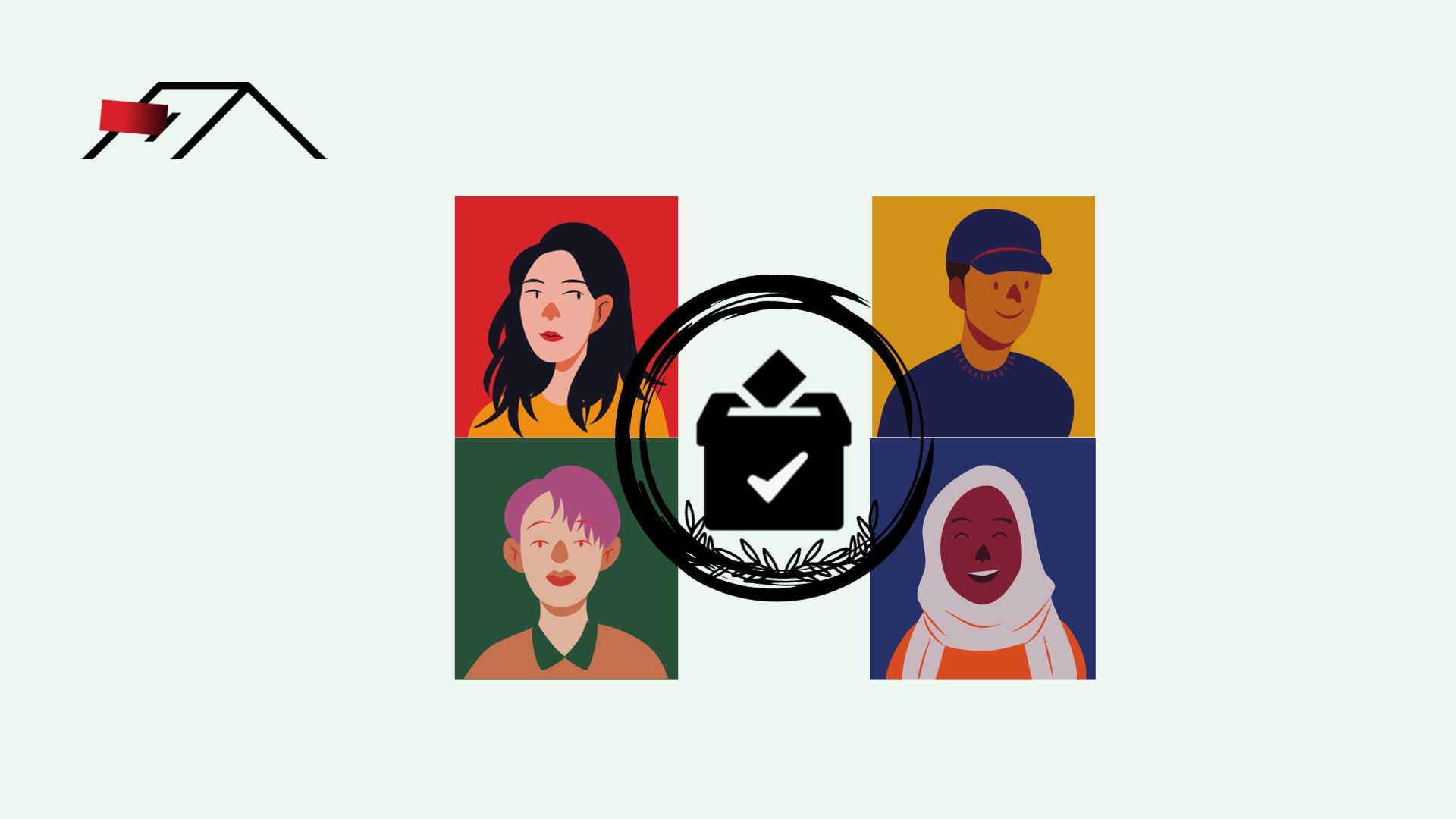“The engagement of young minds in political discourse is the catalyst for societal transformation and a testament to the perpetual renewal of democratic ideals.”
Various studies show that the participation rate of young voters tends to be lower than that of older age groups. Factors such as a lack of understanding of the political process, a lack of trust in the political system, and a sense of apathy are often the main causes of this low participation.
The findings of the Center for Strategic and International Studies (CSIS), for example, This August 2022 study found that young voter participation in the 2019 elections was 91.3%, an increase from 85.9% in the 2014 elections. However, when it comes to views, the percentage of young people who expressed interest in politics was only 1.1%. Many young voters are undecided, pessimistic about the political situation, and lack trust in the political elite.
A survey conducted by UMN Consulting also confirmed this. Based on samples in Jabodetabek in 2022, it was found that 48.25% of Gen Z exercised their right to vote in the 2019 elections, while 4.86% decided to abstain, and 46.88% did not have the right to vote that year. This figure is in the spotlight because it reflects that the majority of young voters are not yet fully involved in the political process that determines the direction of the country.
This research also identified that a lack of trust in political institutions and political parties is one of the main factors inhibiting young voter participation. Dissatisfaction with government performance and the lack of youth representation in political structures are also causes of low participation.
There are also allegations of apathy towards the participation of young voters because the representation of people’s representatives in the previous election was still small among the younger generation. It could also be because many of the youth’s chosen champions have fallen. On the one hand, the people’s representatives elected from the older generation are “distanced” from them, so many young voters then conclude that their votes are only used during election moments. Furthermore, they are not highly regarded by their representatives.
Data from the KPU regarding DPR members elected in the 2019 elections, for example, Of the 575 seats being contested, the age group of elected council members in the 41–50 year range dominates at 82%, with a total of 472 seats. Try to compare this with the number of seats for members aged <30 years who only got 19 seats (3%), and those aged 30–40 years who only got 75 seats (13%).
In fact, during the 2019 elections, based on the KPU’s Permanent Voter List (DPT), the percentage of voters from the 17-39 year age group reached 34.2%. It is very likely that the discussions developing in this young voting age group feel that there is some kind of unavailability of space for actualization for the younger generation, or even worse, allegations that the democratization process has been hijacked and rigged by the older generation to perpetuate its power. Moreover, if we look at the data on violations and guilty verdicts in the 2019 General Election, where the number and variants of fraud were so large, it seems to further confirm that the last election was not really “friendly” for young voters.
Less active
Several opinions identify factors that are obstacles to young voter participation. One of the main factors is their lack of understanding of the political system and their role in it. Understandings about democracy and human rights are very useful provisions for young voters in facing the elections that are being held. Apart from that, the ease of gaining these understandings is also a dimension of human rights, including for young voters in Indonesia.
Inadequate political education at the school and college level often causes young voters to feel disconnected from the political process. Apart from that, there are still many young people who think that politics is not part of them and that politics is synonymous with dirty things.
At least this is according to political communication observer from Multimedia Nusantara University, Silvanus Alvin. He believes that even the younger generation, especially Gen Z, is actually not apathetic towards political issues. According to Silvanus, this young man is quite politically literate because he is exposed to a lot of information via social media. But the problem is, they have preferences for the ideal leader they want. A figure who has no track record of corruption, cares about environmental issues, is technologically literate, and knows how to use it for the future.
This is also in line with the CSIS study in the same paper on young voters in the 2024 general election. CSIS’ findings in the August 2023 survey show that there has been a change in the needs of young voters for the future national leadership. As many as 34.8% of respondents thought that honest and anti-corruption leaders were needed in Indonesia, and 15.9% thought that the character of leaders who were popular and simple. Apart from that, there is also an increase in the need for experienced leaders, increasing from 8.7% in 2019 to 16.8% in 2022.
Several countries have succeeded in increasing youth voter participation through various strategies. For example, the 2019 Australian Election, where election organizers implemented automatic voter registration at the age of 18, used a social media campaign that focused on issues relevant to young voters and involved celebrities and popular public figures to increase appeal. The results are quite significant both in terms of percentage and political constellation.
Discussions about young voters are gaining ground in Australia. Several recent parties have even proposed lowering the age for young voters from the previous minimum of 18 years to a minimum of 16 years. In the parliamentary elections in the Netherlands in 2021, in the midst of the massive COVID-19 issue, the Netherlands finally found a strategic model for approaching using digital and online technology to provide information and campaign materials that are easily accessible, implementing a more flexible election system, including voting. early voting and postal ballots, creating online participation platforms to enable young voters to participate in policy formulation.
Successful models typically involve a combination of political education efforts, the use of technology, and the inclusion of issues relevant to youth in political platforms. Political education starting early in school has proven effective in increasing young voters’ understanding of the political system and the impact of their choices. In addition, campaigns that utilize social media as a tool to build political awareness have also been successful in reaching a wider range of young voters. As the digital infrastructure in Indonesia improves, access to information becomes easier. This means that young voters now tend to have better literacy in information. Technology also allows young voters to access alternative sources of information beyond conventional media.
Even if we want to be bolder, let’s provide a wider space for this young generation to enter the real political stage by adopting a more inclusive electoral mechanism or providing special quotas for young people in political parties. These steps could provide greater incentives for young voters to become actively involved in politics. In addition, it is important to consider the relevance of gender to youth voter participation. It cannot be denied that gender also plays an important role in young voter participation. Young female voters often face additional challenges, such as gender stereotypes and underrepresentation in politics. Therefore, efforts to increase youth voter participation must also pay attention to the gender dimension, ensuring that both young women and men have equal access and receive the same support in the political process.
The future of democracy
Democracy, as a form of government by and for the people, depends for its existence on the active participation of its citizens. In measuring the health of a democratic system, a focus on the participation of young voters is becoming increasingly important. They are the next generation, the leaders of the future, and understanding their role in building the future of democracy is key. Elections are the main pillar of the democratic process. As the general election approaches, the question of how to motivate young voters to get involved is emerging as a major focus. An in-depth study highlights the crucial role of young voter participation in shaping the future of democracy. That young voter has great potential to strengthen the foundations of democracy. However, the challenge faced by this group is a lack of trust in the political system and a sense of apathy. It requires collaboration from all parties to understand how we can guide and encourage young voters to be actively involved.
Young voter participation is not just about voting in elections but also about shaping the future direction of democracy. In the context of the 2024 election in Indonesia, 114 million millennial and Gen Z voters mean that the largest segment that determines the election output is young voters. The involvement of young voters is key to ensuring that their interests are represented and that democracy can develop healthily. In an effort to increase the participation of young voters, concrete steps such as improving political education, wise use of social media, and reform of the political system must be implemented. We can see that this challenge requires a holistic approach involving the government, educational institutions, political parties, and civil society.
By paying special attention to young voters, not only during the campaign but also through ongoing efforts to build political understanding and a sense of civic responsibility, Indonesia can move forward towards a stronger and more inclusive democracy. The future of our democracy depends on the involvement of the younger generation, and it is time for us to work together to build a solid foundation for Indonesia’s political future. []
ARDIANSYAH IHSAN
Activist, researcher, and election observer
 Rumah Pemilu Indonesia Election Portal
Rumah Pemilu Indonesia Election Portal




